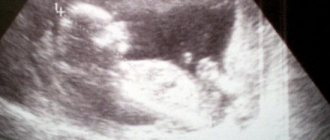Pregnancy without symptoms in the early stages - how is this possible? Lack of menstruation, vomiting, nausea, increased appetite, chest pain - among other symptoms, you may know that a woman is pregnant. However, there are situations when these symptoms do not occur although the fetus is developing.
The cause of early pregnancy symptoms is the hormonal changes that occur in the female body. The body suddenly has to learn to function in a new way, and before it does, it needs time to get used to the changes. For example, vomiting and nausea.
However, according to researchers from the Journal of the Royal Society of Medicine, one in 475 women do not know they are pregnant. She learns about this most often only after the 20th week. However, one in 2,500 women only finds out about this when they go into labor.
What to do next
Of course, all women who have undergone such a test as “regressive pregnancy” are concerned about the possibility of a favorable pregnancy outcome in the future.
The probability of this is quite high, as mentioned above, pregnancy regression often occurs due to the “accidental” influence of some factor, an unfortunate combination of circumstances. And this will never happen again in the future. In some countries abroad, after one regression, a detailed examination is not even recommended, and they resort to it only after repeated regressing pregnancies, since 80-90% of patients after a single regression of pregnancy normally carry a pregnancy to term in the future. However, I think everyone will agree with me that it is better to avoid repeated regressions. Therefore, you need to be examined, and if any violations are detected, treated. Be sure to get rid of infections whenever possible. When hormonal and autoimmune disorders are detected, therapy is most effective if started at the planning stage, and not during pregnancy.
You can plan your next pregnancy no earlier than in six months. This time is necessary for the uterine mucosa and hormonal levels in the body to recover. During this period, it is recommended to take oral contraceptives, as they not only have a contraceptive effect, but also help the body recover from hormonal stress, regulate ovarian function and restore the menstrual cycle.
When planning your next pregnancy, it is important to eat right, get plenty of vitamins (from food or in the form of multivitamin complexes), and lead a healthy lifestyle. This will help the body protect the baby from negative environmental influences during pregnancy.
Don't underestimate the role of bad habits. If “a friend smoked throughout her pregnancy and nothing”, “a neighbor drinks and nothing”, this does not mean that these factors are not harmful to the fetus. The body will be able to protect some, but not others, so the number of harmful factors should be limited as much as possible. Yes, we will not be able to protect the future baby from everything, but we must limit the amount of harmful influences as much as possible.
Without a doubt, a frozen pregnancy is a psychological trauma for a woman, so if you are tormented by obsessive thoughts that you will not be able to have children at all, you are setting yourself up for failure, you should consult a psychotherapist. The role of psychological factors during pregnancy is recognized by most doctors.
I wish everyone a successful pregnancy and the birth of healthy babies!!!
How does fertilization occur?
The complete formation of the fetus begins to occur precisely during the period of ovulation. The egg and sperm meet in one of the fallopian tubes, and the fertilized egg begins its journey to the uterus. Already on the fourth day after the egg is fertilized, it reaches its destination. Next, it begins to divide. In most cases, the egg is attached to the back wall of the uterus at its very bottom.
It moves to this place in order to be implanted into the mucous membrane of the uterus by the end of the first week after conception. Usually, the first week of pregnancy occurs without any visible symptoms. The villi of the embryonic membranes are embedded in the walls of the uterus, while releasing a special substance that dissolves its mucous membrane.
It is during this period that the fetal blood vessels connect with the maternal ones and ultimately form a special embryonic circle of blood circulation. From this moment on, the embryo begins to receive adequate nutrition from the mother. Although before that he fed on the contents of the egg.
Ambiguous early signs of pregnancy
If you talk to experienced women and scientific articles, you can find many possible early signs of pregnancy. Some of them are real, and some are related to the symptoms of diseases, and you need to treat them with the utmost vigilance. Let's start with discharge, thrush, cystitis and acne. For example, discharge after conceiving a child is similar to discharge during thrush. Some people develop thrush after conception, followed by cystitis. It is safer to consult a gynecologist for clarification.
Note that early signs of the second and further pregnancies may be atypical and be somewhat different than during the first. In their early stages, even their complete absence is allowed, and a hidden pregnancy can proceed unnoticed by the expectant mother, especially if she does not keep an exact schedule for her periods or they are irregular. Such women always need to take these characteristics into account.
Signs
Pregnancy is the development and formation of a person, which begins with the fertilization of the mother's mature egg by an active sperm.
From this moment the countdown of the gestation period begins. A small egg goes through a huge number of changes and deformations. In a few days, the zygote, and then the fetus, experiences billions of nerve impulses - this is how a miracle is created.
However, if for some reason a pathology occurs that is incompatible with the life of the unborn baby, the supply of nutrition is stopped and the fetus is rejected by the mother’s body. Depending on the clinical picture, symptoms and signs, pathology is determined early or late.
Can pregnancy proceed without symptoms in the early stages?
How a barely begun pregnancy manifests itself is of interest not only to those who are planning it, but also to those who prefer to abstain from having a child for now. In any case, it doesn’t hurt to psychologically prepare for the presence of the message in your life: “You will have a child!”
And the first thing that worries many at this stage concerns the answer to the question: can pregnancy proceed without symptoms? According to gynecologists, in approximately 7% of cases, pregnancy without symptoms in the early stages is observed. The time of appearance, as well as the nature of the symptoms, largely depends on the individual characteristics of the pregnant woman’s body.
Can pregnancy progress without symptoms until later in pregnancy? There are cases when women consult a doctor on suspicion of pregnancy already in the 5th month, that is, at the moment the child begins to actively grow and the size of the abdomen increases. The menstrual cycle can last up to 2 months after fertilization, and if the state of health does not change in any way, it does not even occur to the woman that she is pregnant.
But more often there are mild signs of pregnancy that are worth paying attention to: mild nausea in the morning, unusual vaginal discharge, nagging pain in the lower abdomen, menstrual irregularities. If all these symptoms appear, you may already be puzzled by their diagnosis.
Upon examination by a gynecologist, it will become clear whether this is pregnancy or a painful disorder.
Symptoms of pregnancy can be divided according to the degree of likelihood into three main groups:
- obvious, indicating the 100% fact of pregnancy;
- probable, when it can be said that most likely this is the case;
- doubtful, in which pregnancy is unlikely.
Obvious signs include facts collected by the gynecologist: a positive pregnancy test, a fetus detected during examination, the result of an ultrasound examination.
Various folk signs and subjective signs can be considered probable: manifestations of toxicosis, increased appetite and weight gain, delayed menstruation, etc.
Signs such as increased irritability, unstable mood and severe fatigue, as well as various digestive disorders are considered doubtful. All these symptoms are nonspecific and can accompany various somatic diseases.
Symptoms of early pregnancy
Some women claim that they feel signs of conception literally in the first hours after sex. However, gynecologists are suspicious of these statements, based on the very biology of conception.
The fact is that sperm remain motile in the female body for up to a week after sexual intercourse. And in any of these 7 days, fertilization of the egg can occur, after which it begins to divide, becoming fixed in the uterus.
This is a very intimate process that occurs on a micro level and cannot be felt physically.
However, in most cases it is necessary to rely on subjective data, the number of which constantly increases as pregnancy continues.
Here is an approximate list of what symptoms may occur during pregnancy:
- Sleep disturbance (usually constant drowsiness, but sometimes, on the contrary, insomnia).
- My head is spinning.
- Blood pressure increases or decreases.
- There are nosebleeds.
- Constant urge to urinate.
- Pulsations are felt in the abdomen.
- Changes in the mammary glands are observed (increase in volume, sore nipples, release of colostrum).
- Gastrointestinal ailments occur (belching, gas, nausea, constipation or diarrhea, decreased or increased appetite, heartburn).
- There is a feeling of heaviness in the stomach.
- Vaginal discharge appears.
- Salivation increases or, conversely, decreases.
- Unexplained temperature deviations appear, accompanied by chills.
- Soreness may occur throughout the body (chest, back, lower abdomen).
- A runny nose constantly lasts or the nose feels swollen.
Often women who have already given birth wonder how different the symptoms of the next pregnancy will be? If the health of the expectant mother is beyond doubt, then the second pregnancy will be relatively easier for her.
In order not to worry about toxicosis, it is advisable to plan a second pregnancy no earlier than 3 years after the first. This is due to the period of complete restoration of iron in the blood.
During the second pregnancy, the belly begins to increase, on average, a month earlier, due to a more distended uterus. A lower abdominal position associated with stretched muscles is also noted. These features result in a reduction in stomach problems and breathing difficulties. However, in the final stages of pregnancy, increased frequency of urination can be predicted.
Termination of the pregnancy process
If we talk about the consequences that come with an unplanned mating, then in this case the opinion of veterinarians is divided. Most of them consider the best way out of this situation to be getting rid of puppies, while others, on the contrary, consider childbirth a healthy process and are categorically against terminating an unplanned pregnancy.
In order to interrupt pregnancy, various drugs are used. They contain a steroid hormone, which includes the active substance estradiol benzoate. This drug is administered to the animal by injection intramuscularly on the 2nd and 4th days after mating, and if this time is unknown, then the procedure is repeated on the 6th day.
Most of the drugs used to terminate pregnancy have a large number of different contraindications, which quite often include:
- Inflammation of the uterus.
- Opening of bleeding.
- Increased estrus period.
- Hormonal imbalances.
Therefore, you should not prescribe medications yourself, so as not to harm your beloved pet.
In order for the birth to take place absolutely normally and the puppies to be born healthy, it is necessary to monitor the condition of your pet throughout pregnancy. If there are any changes in the animal’s behavior or it refuses to walk or eat, you should seek help from a veterinarian as soon as possible.
There is no need to leave your pet unattended during childbirth. Usually this process proceeds normally, but cases are different and at any moment the animal may need help or intervention from a veterinarian. Remember, your beloved dog becomes a mother!
Read more about why a dog may develop mastitis after pregnancy.
All about miscarriage in dogs.
False pregnancy in dogs
Signs of labor in a dog
Discharge in a pregnant dog: normal or symptom
How to understand that a dog is in heat: stages and cyclicity, recommendations
Endometritis in dogs: signs, symptoms, treatment
How to do an ultrasound on a dog
Determining pregnancy using ultrasound
Having noticed the first signs of pregnancy, after a week of delay, you can contact an ultrasound specialist to diagnose pregnancy. In this case, you should remember that the embryo measures about 4 mm, so it is quite difficult to examine it. To do this, the doctor must have extensive experience, and the medical device must be in perfect condition.
When examined using an ultrasound diagnostic device, a gynecologist notes the following changes in a woman’s organs:
- The uterus is an elastic organ, which softens and becomes more pliable with the onset of pregnancy; in addition, after some time, its growth is noticeable.
- The vagina also changes. It becomes a different shade, and its density also changes.
The ultrasound diagnostic method is the most informative for determining pregnancy, as it not only confirms or refutes its fact, but also gives a detailed picture of the condition of the internal genital organs or fetal development.
How to distinguish pregnancy from illness
Classic signs of pregnancy may not always indicate pregnancy itself. For this reason, at the slightest suspicion, you should visit a doctor. We help distinguish pregnancy from possible illness.
- Cramps in the lower abdomen
They manifest themselves 6-12 days after conception during pregnancy. These sensations arise and increase gradually due to increased blood flow to the uterus. Usually last no more than two days. Also, such cramps can be signs of an upcoming period. If menstruation does not occur, you should consult a doctor.
- Increase in basal temperature
Basal temperature, which is regularly measured during a planned pregnancy, increases. An increase is observed after 5-6 weeks from the start of the last menstruation. Also, basal temperature tends to rise during ovulation. A delay in this case does not guarantee one hundred percent pregnancy. To confirm or refute pregnancy, you need to donate blood for hCG at a medical facility.
- Bloating, constipation
Occurs 4-5 weeks after the beginning of the last menstruation. During pregnancy, these phenomena are possible because the hormone progesterone causes relaxation of the intestinal muscles. But bloating and constipation are not the most obvious signs of pregnancy.
- Mood swings (6th week from last menstrual period)
Caused by hormonal changes during pregnancy. Mood changes become more pronounced after a missed period. If these phenomena occur earlier, then most likely they are an indicator of stress or PMS (premenstrual syndrome)
- Hypersensitivity to odors
14 days after conception, increased sensitivity to odors occurs. This phenomenon is triggered by ongoing hormonal changes in the body of a pregnant woman. You may begin to feel nauseous even from previously favorite smells.
- Early toxicosis
Occurs approximately a couple of weeks after conception. If you feel sick in the first week after your last sexual intercourse, then most likely you have a banal digestive disorder.
- Increased fatigue
It may manifest itself 4-5 weeks after the start of the last menstruation. This is how the hormone progesterone shows itself, which, in principle, has a relaxing effect on all systems of the body. This phenomenon quickly passes during pregnancy. Unmotivated weakness can also manifest itself with ARVI, fatigue and various diseases.
- Increase in breast volume at 4-5 weeks
The mammary glands increase in volume and become very sensitive - this is one of the clear signs of pregnancy. As menstruation approaches, similar phenomena may occur.
- Frequent urge to urinate
Particularly typical in the evening and at night. Occur due to increased blood flow to the pelvic organs. Increases the influx of actively produced human chorionic gonadotropin (hCG). During pregnancy, this phenomenon begins 14-21 days after conception.
- Increased heart rate
During pregnancy, the heart is subject to greater stress, because it has to pump more blood, which is necessary to ensure adequate nutrition for the growing uterus and fetus. Increased pulse and cardiac arrhythmias are a common symptom in pregnant women, but they occur at a later stage, when pregnancy is obvious.
Early pregnancy symptoms: listen to yourself and your body to notice changes in time.
You should not trust the following signs:
- Diarrhea. It can occur due to rotavirus entering the body or after eating foods that are not suitable for you or have spoiled.
- A change in taste preferences can be caused by a banal lack of nutrients contained in foods. Therefore, there may be a sudden, increased interest in some products. But you should not ignore such a signal. The body itself tells you what it needs at the moment.
- Pharmacy tests. Good quality tests can show pregnancy, if it has occurred, 10-12 days after conception. A hCG test by taking blood from a vein will help you more likely confirm or refute pregnancy. But an elevated level of human chorionic gonadotropin may indicate malignant tumors. In order to dispel doubts completely, an ultrasound should be done.
Physiological changes in the body of a pregnant woman
How can you understand that pregnancy is developing normally without taking into account the opinion of doctors? To do this, you need to focus on your general condition and feelings. Carrying a child will certainly lead to physiological changes in the pregnant woman’s body. What changes in her body can a woman notice that will indicate a normal course of pregnancy:
- Appearance.
- Performance of the cardiovascular and respiratory systems.
- Functionality of the kidneys, liver and gastrointestinal tract (GIT).
Appearance
It will be quite natural for a pregnant woman to acquire a characteristic appearance that was unusual for her before conceiving a child:
- In addition to the appearance of a tummy, there is a slight increase in the size of the limbs, a decrease in the range of movements in the hip joints, and a change in facial features. Due to the shift in the center of gravity, a woman’s gait and posture changes.
- There is darkening of the skin (pigmentation) in the face, abdomen and nipple area.
- The veins on the lower extremities become more visible. Varicose veins may even appear, which were not typical before conception.
- Due to the enlargement of the abdomen, so-called striae (stripes, stretch marks on the skin) often form on its surface.
- During the period of bearing a child, in some cases a moderate increase in body temperature (low-grade fever) is recorded. As a rule, this is observed up to 4 months and is associated with normal hormonal changes in the body of a pregnant woman. By the way, an increase in rectal temperature is considered to be one of the early signs of pregnancy.
- The mammary glands undergo significant changes, the swelling and increase in volume of which is simply impossible not to notice. The size of the nipples also increases. In addition, due to pigmentation, the nipples and area around the nipple become dark brown.
Cardiovascular and respiratory systems
As a rule, the first trimester is characterized by low blood pressure, but starting from approximately the 29th week, there is a tendency to increase, which sometimes makes it difficult to diagnose true hypertension. With the growth of the fetus and the enlargement of the uterus, the heart rate also increases slightly (within 84–90 beats per minute).
Fluctuations in blood pressure and hormonal changes in the female body often lead to disruption of the heart, which can manifest itself as arrhythmias and extrasystoles.
The additional load on the lungs, associated with the fact that you have to provide oxygen not only to yourself, but also to the fetus, leads to the development of shortness of breath. Pregnant women, especially in later stages, experience certain difficulties in performing normal physical activity. An attack of shortness of breath and rapid fatigue can be observed even when climbing stairs just a few floors.
Nevertheless, all this is considered within normal limits, unless, of course, the pregnant woman suffers from some pathology of the cardiovascular and/or respiratory systems.
Digestive and urinary systems
Quite often, pregnant women's taste preferences change dramatically. Some pregnant women develop a sharp aversion to certain types of foods (for example, meat, cheese, sausages, butter), while others may generally be drawn to inedible things (clay, chalk).
In some cases, there is an increase in appetite, in others, on the contrary, a significant decrease. Also, due to decreased intestinal tone, pregnant women are more prone to constipation. This is normal and does not require correction with medications, except by changing your diet.
Increased stress on the kidneys often leads to frequent urination. In the absence of other symptoms, frequent urination should be attributed to natural physiological changes in the body of a pregnant woman, and not to the clinical manifestation of any disease.
Reliable signs of pregnancy
True signs of pregnancy in the first month include characteristic symptoms that appear a few weeks after fertilization. As a rule, the time of their appearance is the third or fourth week of pregnancy, when changes in the mother’s body gain momentum. Their appearance can tell a woman that conception has occurred. But not all of them will necessarily appear: the absence of any of these symptoms is only an individual feature of the body.
Delay of menstruation
As a rule, a healthy woman's periods come at the same time, although slight fluctuations of 1-2 days in one direction or another are possible due to illness or stress. Therefore, a delay of 4 days is already a reason to listen more carefully to your feelings and conduct a pregnancy test.
If the cycle is not very regular, then a delay of up to 5-6 days, not accompanied by other symptoms, cannot yet serve as a reliable sign of pregnancy. In this case, it is advisable to postpone the test until 7-8 days of delay, since earlier it can give either a false positive or a false negative result.
Signs of pregnancy in the first days of the delay already appear more noticeably, so if the absence of menstruation is accompanied by copious white discharge, increased fatigue and drowsiness, chest pain and nausea, the woman may well think about her interesting situation.
Breast swelling
Another characteristic symptom is changes in the mammary glands. They may swell, become painful, sensitive, the areola darkens - although all this is an unreliable sign. Typically, the increase in progesterone secretion associated with conception causes a noticeable increase in breast size, as well as the appearance of nipple bumps. Sometimes colostrum may ooze.
Nausea
Many women are waiting for pregnancy with fear, having heard enough horrors about toxicosis. Of course, it also happens that nausea and vomiting simply drive the expectant mother to exhaustion, and the smell of some foods literally turns her inside out. But for many girls, morning sickness passes quickly, causing almost no inconvenience. And some women note that they have not encountered toxicosis at all.
Asymptomatic pregnancy is a reality
A natural sign of pregnancy is a growing belly. It is by the presence of this change that pregnancy can be determined. On the other hand, not all expectant mothers experience a pronounced increase in volume. As mentioned above, menstruation may be present in the first trimester. Toxicosis, breast enlargement or swelling, weakness and drowsiness may not be felt at all.
Approximately 10 women out of 100 who have given birth will say with confidence that pregnancy without symptoms occurs. The exact reasons for this phenomenon have not been identified. Most often, gynecologists are faced with cases of late detection of pregnancy, when a woman comes to an appointment and complains of an enlarged belly and strange sensations.
Sometimes expectant mothers complain of minor ailments, such as morning sickness, whitish discharge and delay. But these signs are taken not for pregnancy, but for a malfunction of the body.
Doctors advise to undergo timely examinations and tests in order to monitor your own health. Periodic examination will help prevent the development of various diseases and detect pregnancy in time. After all, women are often interested in the question, is pregnancy without signs possible? This can happen, but there is no need to worry about this, each body is individual and can react specifically to conception.
Pregnancy without symptoms - how can this be?
Despite popular belief, it is actually quite common for women to not notice any symptoms in the first weeks or months after conception. Every woman experiences pregnancy differently, and because of this, not everyone will experience common symptoms such as bloating, cravings for certain foods, or morning sickness. In fact, the most common feeling during pregnancy is increased fatigue, and some women don't even notice it. Therefore, a period of bearing a child without symptoms is quite possible.
When you are not completely sure about your pregnancy
In most cases, when you suspect pregnancy but still have no symptoms, you are in one of two situations:
- you have had a positive home pregnancy test (but still need to see a doctor);
- or you still have a period of “two weeks of waiting after ovulation”, but before a possible delay in menstruation.
Whatever the case may be in any of these situations, the best option is to wait and take care of yourself in the meantime. You'll probably soon be able to confirm (or not) your assumptions.
When the doctor confirmed your pregnancy
In some cases, your doctor has already confirmed that you are expecting a baby, but you have no signs of pregnancy. This may mean that you are the “lucky one” who will not experience any unpleasant pregnancy symptoms such as bloating or food cravings. Also, some women experience them, but they mistake them for normal everyday sensations. Examples are increased appetite or increased energy.
Polycystic ovary syndrome (PCOS)
Polycystic ovary syndrome appears to be a common cause of pregnancy without symptoms. Many women who have this condition will have no or only mild symptoms. They may only occasionally notice things like morning sickness, breast tenderness or hunger, and they won't be as severe as most expectant mothers. So if you have PCOS and become pregnant, you shouldn't be surprised if you don't experience any symptoms. This does not indicate anything is wrong with you or the child. Talk to your doctor about this condition.
Watch for signs of miscarriage
If you have symptoms of pregnancy in the first few weeks and then they disappear, you may have a miscarriage. You should contact your doctor immediately at any stage of pregnancy when symptoms suddenly stop.
Most women realize that they are having a miscarriage by severe abdominal pain, as well as constant cramping and bleeding. But sometimes termination of pregnancy will not lead to these symptoms, especially in the early stages. Monitor your pregnancy to avoid unsuspecting miscarriages.
Symptoms
In order to find out whether bearing a child in the early stages can proceed without noticeable changes, you should remember the main signs of the beginning of embryo development in a woman’s body:
- The first and main one is a delay in the onset of the menstrual cycle. Normally, every month a woman begins menstruation, during which an unfertilized egg leaves the body with blood and epithelium.
- The next common symptom is morning sickness. In some cases, toxicosis is permanent. Nausea indicates the beginning of hormonal changes in the body and the beginning of the process of preparation for bearing a child and childbirth.
- The most obvious is an increase in the size of the abdomen. This usually occurs after the second month (at 7–8 weeks).
- A change in taste preferences also indicates hormonal changes.
- Breast enlargement and painful sensations in it - this is how the mammary glands prepare for lactation.
- Mood swings are associated with an increase in the release of various hormones into the blood. Fluctuations in emotional state from happy to sad and vice versa may indicate pregnancy.
In some cases, aching pain in the lower back and lower abdomen, drowsiness or insomnia, skin rashes, swelling and frequent urination are possible. However, everything is individual and depends on the health of the expectant mother, the presence of chronic diseases and other reasons.
Precise definition
If a girl thinks that she is carrying a child, but there are no obvious signs of pregnancy, then, first of all, she needs to make an appointment with her gynecologist and undergo an examination.
- If the period is too short, you can conduct a test. Fortunately, today there are a great many of them in pharmacies. So, you can use the cheapest strip test or the more expensive and accurate tablet test.
- In addition, it is possible to take a urine test to detect elevated levels of human chorionic gonadotropin - this is a specific hormone that begins to be produced in the female body after fertilization of the egg.
At a later date, you can undergo an ultrasound examination and find out for sure whether the woman is pregnant or not.
Anything can happen in life, sometimes doctors are surprised: how can you miss a pregnancy? This is not uncommon nowadays, as we are often susceptible to stress, mood swings, and general fatigue. These symptoms may indicate the development of the embryo, but are quite often regarded as ordinary overwork.
In addition, if the body is special, then there may not be obvious signs (nausea, breast enlargement, delay). As a result, a woman does not realize that she is pregnant until she accidentally sees a gynecologist (for a preventive examination or on the referral of a therapist).
The most common symptoms of pregnancy
Let's talk about perhaps the most obvious and common symptoms of pregnancy. And so we can distinguish:
- A delay in menstruation is a symptom without which more than one normal pregnancy cannot proceed, although during pregnancy a woman may have bleeding, but this should not be confused with menstruation; such discharge does not indicate a great danger of termination of pregnancy. And if you experience bleeding during pregnancy, especially in the first trimester, immediately seek help from a professional gynecologist. If you consult a doctor in a timely manner, pregnancy can be saved. The absence of a woman’s menstrual cycle continues throughout pregnancy and, most often, throughout the entire period of breastfeeding.
- Basal temperature is another important symptom by which pregnancy can be determined; it is mandatory and is measured in the rectum. When pregnancy occurs, the basal temperature will be above 37 degrees. A decrease in basal temperature in the first week of pregnancy is a rather dangerous sign; you should immediately seek help from a gynecologist. Doctors advise measuring temperature in the morning, when the likelihood of an accurate measurement is very accurate. You can read more in the article basal temperature during pregnancy.
- Increased discharge is another symptom; it is worth noting right away that by discharge we mean healthy discharge that does not have a distinctive color or odor, most often colorless. Increased discharge does not indicate any problems, but if, during the period of heavy discharge, a scarlet color, a strong odor, or itching in the perineum appears, you should consult a doctor.
- Headaches, an unstable emotional background, a feeling of fatigue and constant drowsiness appear due to hormonal changes, although these symptoms do not always appear during pregnancy and are quite safe for the health of the mother and the unborn baby, it is still worth remembering that taking medications for your provisions should only be taken after consultation with a doctor.
- Frequent urination and constipation can also be symptoms of pregnancy. They are a side effect of changes in hormonal changes in the body, which is primarily due to an increase in the size of the uterus, which begins to compress the intestines and bladder. We can only advise you to maintain the correct daily routine and create a balanced diet. You can read more about proper nutrition, problems with stool and their solutions in the article “Upper abdomen hurts during pregnancy.”
- Toxicosis, probably this particular symptom gives expectant mothers a lot of unpleasant sensations and difficulties, but alas, this symptom of pregnancy is quite common, although many women encounter it only in the morning hours. If toxicosis manifests itself in a mild form, then folk remedies are also suitable for its treatment, but if vomiting accompanies you all day, then treatment should take place in a hospital under the supervision of a doctor. Indeed, in the case of severe toxicosis, dehydration of the woman’s body can occur, which is a very negative factor for pregnancy. For most women, toxicosis lasts the first 10-15 weeks of pregnancy.
Asymptomatic pregnancy is a reality
A natural sign of pregnancy is a growing belly. It is by the presence of this change that pregnancy can be determined. On the other hand, not all expectant mothers experience a pronounced increase in volume. As mentioned above, menstruation may be present in the first trimester. Toxicosis, breast enlargement or swelling, weakness and drowsiness may not be felt at all.
Approximately 10 women out of 100 who have given birth will say with confidence that pregnancy without symptoms occurs. The exact reasons for this phenomenon have not been identified. Most often, gynecologists are faced with cases of late detection of pregnancy, when a woman comes to an appointment and complains of an enlarged belly and strange sensations.
Sometimes expectant mothers complain of minor ailments, such as morning sickness, whitish discharge and delay. But these signs are taken not for pregnancy, but for a malfunction of the body.
Doctors advise to undergo timely examinations and tests in order to monitor your own health. Periodic examination will help prevent the development of various diseases and detect pregnancy in time. After all, women are often interested in the question, is pregnancy without signs possible? This can happen, but there is no need to worry about this, each body is individual and can react specifically to conception.











